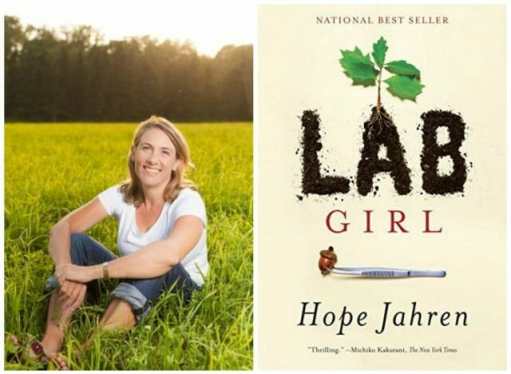Hope Jahren is a geobiologist, a writer, a teacher, and an extraordinarily interesting person. In 2016 she wrote Lab Girl, a personal and professional memoir that rightfully garnered all manner of awards. It’s a beautiful, carefully crafted work that I would like to encourage you to read – and for you to recommend to anyone you know who is thinking about a possible career in science. Lyrical, informative, messy and engrossing, Lab Girl is a paean to science and discovery.
Jahren studies plants and plants’ interaction with the larger environment. She loves plants, is endlessly fascinated by them, and her passion and curiosity carriers her – and the reader – through her career and research around the world. She grew up in rural Minnesota, the child of reserved and loving parents. Her father taught earth science at a community college and her mother is a brilliant women whose academic ambition was thwarted by economic hardship. The family had a productive and dynamic garden. Jahren’s description of it, the sounds that it made, and her father’s lab as well as the nearby woods all set the stage for her lifetime’s work. Her sacred space is her laboratory, where she can be all that she hopes while still wrestling with all that she cannot accomplish. It is her church.
The book is organized into three sections, and each section looks at both a botanical topic (“Roots and Leaves,” “Woods and Knots,” “Flowers and Fruit”) and corresponding personal history and reflections. We learn about botany and research as we learn how Jahrens was educated, how she paid for school and then how her career as a research scientist developed over the years. Her extraordinarily eccentric and equally obsessed lab partner, Bill, serves as a way for Jahren’s narration to get out of her own head. Bill is quite the character and it’s easy to see the two of them digging in soil and arguing about some topic. The stories of their interactions and their students bring life to the hard work that comprises the day to day of a research faculty member with teaching responsibilities.
There’s nothing pedestrian, though, about Jehrens. Her writing is outstanding, memorable and compelling. She doesn’t crow about her science; she’s far too aware that her work is part of a larger narrative. That’s one of the threads woven into the book, how much of scientific research is a community, a practice and a way of life and learning. Check out Jahrens biography online, though, and it’s obvious that her work is extremely important in the field. She has received three Fulbrights, awards for her research, and is now a full professor at the University of Oslo in Norway.
I hope that Lab Girl is read for many decades to come, inspiring young men and women to follow their passion for science into careers. Jahrens has a new book out, too, about climate change, and I’m optimistic that her voice will be an important addition to those seeking change.
Sometimes it isn’t the big things that clue you into an author or a work. Rather, a small piece of information can tell you all that you need to know. Jahrens has a blog and its title pretty much sums her up: www.hopejahrensurecanwrite.com. She most certainly can.
David Potash
